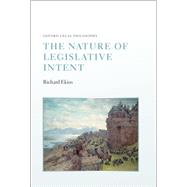
Note: Supplemental materials are not guaranteed with Rental or Used book purchases.
Purchase Benefits
Looking to rent a book? Rent The Nature of Legislative Intent [ISBN: 9780199646999] for the semester, quarter, and short term or search our site for other textbooks by Ekins, Richard. Renting a textbook can save you up to 90% from the cost of buying.
| List of Abbreviations | p. xiii |
| Introduction | p. 1 |
| Sceptical Arguments | p. 15 |
| Stipulating Legislative Intent | p. 15 |
| Hermes and 'the Catalogue of Mysteries' | p. 20 |
| The Unitary Model and Its Discontents | p. 30 |
| An Alternative: the Voting Machine Model | p. 34 |
| Arrow's Theorem and the Legislative Process | p. 40 |
| Joint Intention and Group Agency | p. 47 |
| The Futility of Summing Intentions | p. 47 |
| Joint Intention and Group Action | p. 52 |
| Complex Group Action | p. 57 |
| Discursive Dilemmas and Collective Irrationality | p. 66 |
| The Idea of Group Agency | p. 71 |
| Legislating Without Reasoning | p. 77 |
| The Forum of Policy | p. 77 |
| Technical Problems With Preference Aggregation | p. 85 |
| Reasons and Preferences | p. 88 |
| The Authority of Unintentional Legislation | p. 94 |
| Rationality and the Voting Machine | p. 99 |
| The Minimal Intention Argument | p. 107 |
| Intelligible Legislating | p. 112 |
| What It Is to Legislate | p. 118 |
| Legislative Capacity | p. 118 |
| How One Reasons to Legislate | p. 127 |
| The Act of Legislating | p. 135 |
| Legislative Integrity | p. 139 |
| The Legislative Assembly | p. 143 |
| The Problem of the Sole Legislator | p. 143 |
| Representation and Deliberation | p. 146 |
| The Advantage of an Assembly | p. 155 |
| The Internal Hierarchy of the Legislature | p. 161 |
| Washington and Westminster | p. 169 |
| Prospects for Reasoned Action | p. 173 |
| Language Use and Intention | p. 180 |
| The Language Code | p. 181 |
| Language Use Is Rational Action | p. 193 |
| The Underdetermination Thesis | p. 196 |
| Pragmatics | p. 205 |
| Legislative Language Use | p. 211 |
| The Nature of Legislative Intent | p. 218 |
| The Standing Intention of the Legislature | p. 219 |
| Parliamentary Procedure | p. 224 |
| Legislative Intent in Particular Acts | p. 230 |
| Agency and Compromise | p. 236 |
| Intentions in Interpretation | p. 244 |
| The Object of Interpretation | p. 244 |
| Intentions, Purposes, and Applications | p. 249 |
| Legislative Context | p. 256 |
| The Use and Misuse of Context: Some Examples | p. 261 |
| The Relevance of Legislative History | p. 268 |
| Equitable Interpretation | p. 275 |
| Bibliography | p. 285 |
| Index | p. 294 |
| Table of Contents provided by Ingram. All Rights Reserved. |
The New copy of this book will include any supplemental materials advertised. Please check the title of the book to determine if it should include any access cards, study guides, lab manuals, CDs, etc.
The Used, Rental and eBook copies of this book are not guaranteed to include any supplemental materials. Typically, only the book itself is included. This is true even if the title states it includes any access cards, study guides, lab manuals, CDs, etc.